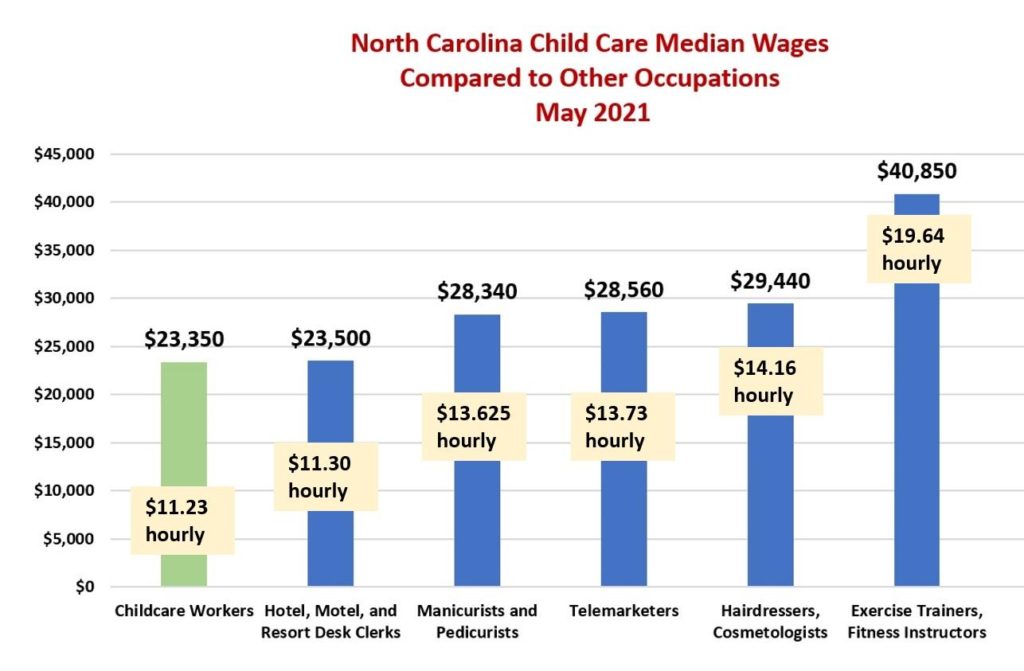
In North Carolina and across the country, the child care industry is struggling to recruit and retain workers. It’s a tight labor market, and child care programs report difficulty in paying wages that are competitive with other community employers (such as Target or Walmart or McDonalds).
Unlike other local employers, child care programs are looking for individuals who have a passion for working with children and also have early childhood competencies important for a business based on promoting the healthy development of children.
Low wages have long been a problem. The most recent data shows the occupation of child care continues to be one of the lowest paying fields.

Boosting wages for the child care workforce will require a long-term policy strategy. As I’ve written before, parents just can’t afford the cost of high-quality child care — one component of which is pay for the workforce aligned with the important work that they do. However, there are strategies that can play an important role in recruitment and retention. One such strategy is Child Care Services Association’s National Early Childhood Educator Apprenticeship Program.
Apprenticeships, as a concept aren’t, new. In fact, August marked the 85th anniversary of the National Apprenticeship Act. The law formally established the U.S. Department of Labor Registered Apprenticeship Program and was accompanied by regulations to protect the health and safety of apprentices and to protect apprentices from racial, gender, and other forms of discrimination. It is through the National Registered Apprenticeship Program that the CCSA T.E.A.C.H. National Center applied and was awarded a Department of Labor registered apprenticeship model for early childhood educators.
Traditionally, registered apprenticeships were in the trades — auto mechanics, plumbing, engineering, and other occupations mostly dominated by men and geared toward portable workforce certifications within the industry. Also, historically, early childhood professional development organizations mostly focused on training funds from their state human resources or education department — departments that typically received funding from the U.S. Department of Health and Human Services. In contrast, the certification for registered apprenticeships is through the U.S. Department of Labor.
The CCSA National Early Childhood Educator Apprenticeship Program provides a unique opportunity to support skill development in the high-demand field of early childhood education. The program is uniquely structured to provide mentoring support and a comprehensive scholarship (we support using the T.E.A.C.H. Early Childhood scholarship) so that apprentices can access and complete college early education coursework debt-free. Participants are able to gain employment, attend college courses to boost early education competencies, and also work toward industry-recognized credentials and degrees.
Apprentices in the CCSA National Early Childhood Educator Apprenticeship Program will be employed as early childhood educators in early learning programs. Apprentices will work under the supervision of a site director and/or a mentor for at least one year or until the completion of a degree and will complete 2,000 hours of on-the-job (OTJ) training as part of the apprenticeship program. Pay increases as hours and milestones are achieved.
CCSA developed the National Early Childhood Educator Apprenticeship Program with the U.S. Department of Labor to raise awareness of the importance of retaining and maintaining a stable early childhood workforce by blending employment, on-the-job training, college coursework, and individualized mentoring.
Last month, the first six states to participate in CCSA’s National Early Childhood Educator Apprenticeship Program were selected. Blazing the trail are:
- Arkansas (Arkansas Early Childhood Association)
- Colorado (Early Childhood Council Leadership Alliance of Colorado)
- Minnesota (Child Care Aware® of Minnesota)
- Ohio (Ohio Child Care Resource and Referral Association)
- Pennsylvania (Pennsylvania Child Care Association), and
- Wisconsin (Wisconsin Early Childhood Association)
Lead organizations will work with CCSA’s National Center Division to develop pilot apprenticeship programs and will receive ongoing support and technical assistance to implement their model.
While it is exciting to launch the first six initiatives, CCSA is also thinking ahead to the next cohort of states that may be interested in designing and implementing their own apprenticeship programs utilizing the U.S. Department of Labor CCSA model. If you are interested in learning more, check out the CCSA National Early Childhood Educator Apprenticeship web page. You can also contact Edith Locke, edithl@childcareservices.org and/or Megan Burk, meganb@childcareservices.org.
The future of work continues to evolve but for the child care field — it’s on-site work. The apprenticeship model is an opportunity to strengthen the workforce and increase pay. Both goals are important for the child care market. Children, parents, employers, and communities depend on access to child care and a high-quality early educator workforce.




